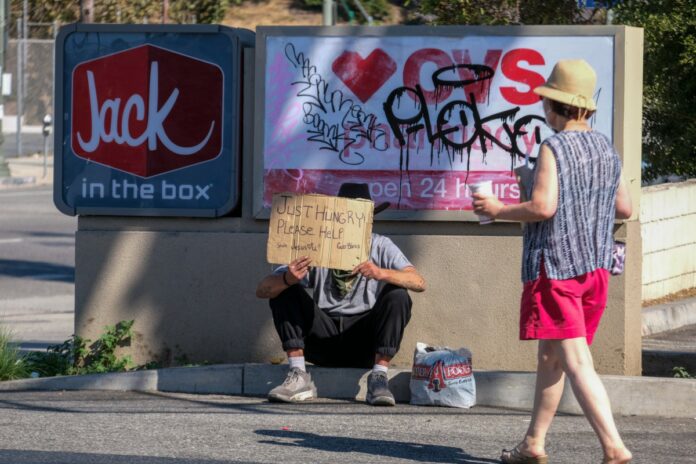As a proprietor of a gun store located in Burbank, I have a unique vantage point from which to observe the complex societal challenges that beset our city. Among these trials, the insidious grip of opioid addiction stands out as a blight that not only devastates lives but also fuels a dangerous uptick in crime. However, as we confront this epidemic, it’s crucial to recognize the multifaceted nature of our county’s woes, compounded by factors such as corporate malfeasance, rampant homelessness and a staggering cost of living.
The steady influx of patrons seeking firearms for self-defense serves as a stark reminder of the pervasive fear and vulnerability that permeate our neighborhoods. This phenomenon is often attributed solely to individual anxieties, but is, in fact, linked to broader systemic failures, such as the opioid crisis. McKinsey Consulting’s strategic partnership with Purdue Pharmaceuticals, designed to maximize profits from highly addictive opioids such as OxyContin, cannot be overstated in its contribution to addiction and the ensuing surge in criminal activity. The consequences are dire: fractured families, embattled communities, and lives shattered by violence.
The consequences are dire: fractured families, embattled communities, and lives shattered
by violence.
As custodians of public safety, we cannot ignore the systemic failures that fueled the opioid crisis. We must hold accountable the corporate entities that played a significant role in its devastation and implement stricter regulations to prevent similar tragedies. Undoubtedly, powerful players like Purdue Pharma bear significant responsibility. Last year, the company pleaded guilty to three criminal charges related to its marketing of OxyContin, agreeing to pay more than $5 billion in fines and resolve thousands of lawsuits from individuals and communities harmed by the drug. Similarly, McKinsey & Co., a consulting firm that advised Purdue on marketing strategies, settled lawsuits totaling over $640 million for its role in perpetuating the crisis. Yet, they remain influential actors fueling socio-economic disparities in Los Angeles County.
‘Face the looming specter of homelessness’
To comprehensively mend the tears in our social fabric, we must also squarely face the looming specter of homelessness that casts a shadow over our streets. The visible presence of individuals grappling with homelessness underscores systemic failures in our social safety net and exacerbates feelings of insecurity among residents. According to the latest data from the Los Angeles Homeless Services Authority, there were approximately 41,290 individuals experiencing homelessness within the city of Los Angeles in 2021, representing a staggering 16.1% increase from the previous year. This figure includes individuals living on the streets, in shelters and in vehicles.
As resources are strained and support systems falter, marginalized individuals are left vulnerable to exploitation, some succumbing to the numbing allure of substance abuse, perpetuating the vicious cycle of addiction and crime. The National Alliance to End Homelessness highlights that individuals experiencing homelessness are disproportionately affected by substance use, with rates of substance-use disorders among this population being three to four times higher than those found in the general population. This correlation underscores the complexity of addressing homelessness effectively, necessitating comprehensive approaches that incorporate access to housing, mental health services and substance use treatment.
The exorbitant cost of living in Los Angeles serves as another potent accelerant, stoking the flames of desperation that drive individuals to desperate measures. Skyrocketing rents, coupled with stagnant wages, force many residents to confront the harsh reality of financial precarity, leaving them vulnerable to exploitation and entrapment in the cycle of addiction and crime.
Los Angeles ranks among the most expensive cities in the United States, with exorbitant housing costs and high living expenses placing immense financial strain on residents. According to the U.S. Census Bureau, the median home value in Los Angeles County stands at $752,508, far surpassing the national average. This financial strain leads many residents, particularly those in low-income brackets, to resort to criminal activities to survive.
This desperation is reflected in the surge of retail theft incidents across the city. In recent years, reported incidents of retail theft have risen by over 50%, according to the Los Angeles Police Department, with organized retail crime rings becoming increasingly prevalent. The unsustainable cost of living in Los Angeles exacerbates socioeconomic disparities and fosters an environment where criminal behavior thrives, underscoring the urgent need for comprehensive solutions to address housing affordability and economic inequality.
Personally, I have firsthand experience of the dire consequences of this desperation, having fallen victim to retail crime when my gun store was targeted for robbery last year. This violation left an indelible mark, deepening my understanding of the urgent need to exercise my Second Amendment rights to safeguard myself, my establishment and my clientele. Now, more than ever, we must redouble our efforts to address the systemic issues that drive individuals to resort to such violent and desperate measures.
While firearms may offer temporary reassurance to some, they alone cannot resolve the deep-seated challenges that confront our communities. It is only through a comprehensive approach that addresses the intersecting issues of corporate misconduct, homelessness and economic inequality that we can truly create safer, more equitable communities for all.
Jonathan Solomon and his wife, Geneva Solomon, founded Redstone Firearms in 2015. The store, which is in Burbank, offers firearms classes.

